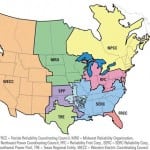By Kennedy Maize
Washington, D.C., 5 May 2012 — A Federal Energy Regulatory Commission financial audit finds that the North American Electric Reliability Corp. is failing to focus its work on the new, mandatory electric grid reliability powers Congress gave it in the 2005 Energy Policy Act. Instead, says the FERC staff audit released May 4, NERC has continued to emphasize the voluntary approach that characterized its past as an industry-supported consensus organization.
The staff report is not the typical pro forma wrist-slap that one often finds in federal agency audits, although there is some of that in the report. It is, instead, a sharp blow directly across the chops of the organization chartered to be on the front line of the battle to keep the nation’s electric grid up and functioning smoothly.
In the audit, the first ever for Atlanta-based NERC, which exists separately from FERC but reports to the Washington agency, the FERC staff found that NERC was falling into a pattern of business as usual. “Audit staff is concerned,” the report said, “that NERC as the [electric reliability organization or ERO] has continued, and at times expanded, its historic mission of seeking voluntary reliability activities, rather than the specific mandatory objectives of the ERO as authorized [in the 2005 law].” The staff charged that “NERC, in its practices, adopted a policy of undertaking some activities based on the loosely defined relationship of the activity to a perceived reliability concern. No criteria as to whether they were mandatorily enforceable via commission-approved standards, or clearly defined and approved as a monitoring activity were developed or deemed necessary.”
The FERC audit also takes NERC to task for opaque budgeting. “NERC’s budget process did not provide sufficient transparency to allow the commission, the [board of trustees], and stakeholders to efficiently and effectively evaluate annual budget requests and subsequent requests to change approved budgets,” the staff found. “As a result, NERC funded unbudgeted activities and significantly deviated from its budgeted activities without approval from the commission or the [trustees].” NERC’s budget, the audit concluded, is largely fiction: “For a variety of reasons during the operating years, NERC has been unable to expend funds according to the proposed expenditures it presented in its budget.”
The FERC audit also found “confusion” in NERC’s dual roles in performing as the national ERO and its job running the Electric Sector Information Sharing and Analysis Center (ES-ISAC) for the Department of Energy and the Department of Homeland Security. The center’s role is “to gather information and communicate security-related threats and incidents within the sector, with United States and Canadian government agencies, and with other critical infrastructure sectors.” This includes gathering and reporting cyber-security information, although neither FERC nor NERC have a clear role in grid security. The FERC audit staff recommended that the commission and NERC work together to better define the role of the ES-ISAC.
Altogether, the FERC audit found 11 areas of “concern” with NERC’s operations and made 42 recommendations for action. NERC disagreed with 10 of the concerns (choosing not to challenge a finding related to calculating retirement benefits) and said it is contesting 25 of FERC’s recommendations. NERC’s detailed comments are included in the FERC staff report.
In a press release, NERC objected to the process of the first-of-its-kind audit, complaining that FERC’s enforcement office “has declined to negotiate as is the norm and, instead, opted to initiate litigation on portions of the audit findings and recommendations.” NERC general counsel David Cook said, “Although we understand that all FERC commissioners will ultimately review any contested issues, we regret that a litigation process was chosen rather than our invitation to work out the differences through the standard method of negotiation.” The NERC written response says its has doubts about the FERC staff’s “objectivity and balance” in the audit, and that the audit looks too much at management practices, rather than whether NERC has complied with FERC rules.
Appearing to be carrying NERC’s case, FERC Commissioner Cheryl LaFleur in a written statement said that she believes “the audit report as presented by staff should have been subject to a vote of the full commission prior to issuance.” In a cover letter to the report, Norman Bay, director of FERC’s office of enforcement, noted that the FERC staff audit was done under formally delegated commission authority (18CFR375.211) and NERC may ask the commission to review all the findings and recommendations, contested or uncontested.
Also in a written statement, Commissioner Philip Moeller appeared to be supporting the process of the staff audit. “The commission’s audit staff has extensive experience conducting financial performance audits,” he said. He added, “Should NERC determine that some of these matters would benefit from commission review, they now have 30 days to request such review.”









